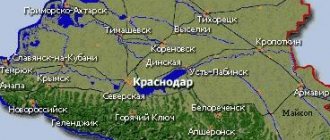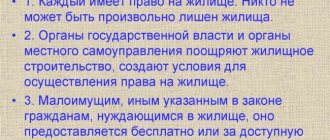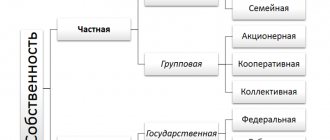In paragraph 1 of Art. 212 of the Civil Code of the Russian Federation lists the main forms (types) of property recognized in the Russian Federation. Following Art. 8 of the Constitution it refers to private, state and municipal.
The form of ownership refers to legally regulated property relations that characterize the assignment of property to a specific owner by right of ownership.
The subject of property rights can be almost any subject of civil legal relations: from the state to private individuals. Restrictions regarding the acquisition of property rights may be established in relation to certain categories of entities if there are sufficient grounds.
Concept of property and property rights
What is property ? This is the ownership of things by certain persons, as well as the relationships that arise in connection with the ownership of property. That is, property is both a legal and an economic category.
Legal ownership is the right to own things. Consists of the right to own, use and dispose of one’s property.
Property as a civil law institution is a set of legal norms that are aimed at regulating economic property relations using civil law methods.
Property in economics is social relations within the framework of ownership, division and redistribution of property objects. What is important is the actual relationship - who really controls the property and makes decisions about its use, disposes of it, and not the formal right according to documents.
The economic content of property is revealed through ownership, management and control.
Property is a basic economic institution that has existed since people first had things and such concepts as “mine” and “someone else’s.”
We have learned the basic definitions of property, now let's move on to its types.
What is this
The concept means the relationship between distribution and appropriation. Characterizes the right of a subject (legal entity, individual or group of persons) to dispose of its property rights, having certain goals.
Today, in order to determine which 4 main forms, types and subtypes of property are enshrined in the state, you can study the provisions in civil law, data in Russian legislation regarding the scheme and special specified codes, and also study the provisions provided for in the Constitution of the Russian Federation.
Forms of ownership in the economy
A modern market economy is an economy with mixed ownership. Therefore, the law recognizes various types of property, including mixed ones.
Forms of ownership are discussed in detail in high school social studies classes. We will consider only the main classifications.
Forms of ownership in the Russian Federation are divided into the following types:
- State federal - natural resources included in economic circulation, means of production, information, that is, everything that is under the jurisdiction and disposal of the state and under its responsibility.
- State regional - all the same, transferred to the subjects of the Federation.
- Municipal property, which is under the jurisdiction of local governments.
- Private - property of citizens and legal entities.
- Property of public organizations.
From the point of view of legal regulation, property can be divided into the following groups:
- Real estate - land, buildings, structures, infrastructure.
- Movable property is something that can be moved: machinery, equipment, tools.
- Intellectual property is a product of human mental activity: scientific works, manuscripts, inventions, discoveries, achievements in art and literature.
Classification of forms of ownership by legal regime:
- Based on the subjects (owners) of property - individual citizens, groups, legal entities, the state.
- According to the form of appropriation - individual, collective and state property.
- According to the composition of subjects (owners) - individual, group, public.
Types of property based on numerical characteristics:
- Private property is something that belongs to one person.
- Collective property is something that belongs to a group of people, and each of them has some part in this property.
- Public property is something that belongs to everyone.
Prepare for the Unified State Exam in Social Studies with courses from Skysmart - fun and effective!
Features of the use of OKFS
The developers of the classifier have provided several applications for it. Thus, for ease of use, in Appendix B the codes are arranged alphabetically, and in Appendix C - in ascending order.
Appendix A is explanatory in nature. It reveals the concepts of the classifier. The terms are accompanied by references to legislative norms and interpretations arising from the practice of economic and social life.
For example, when characterizing state property, a reference is made to Art. 214 Civil Code of the Russian Federation; when characterizing the property of state corporations, it is emphasized that this is property that the state corporation owns as an owner. The main features are identified by which an OKFS user can accurately identify the required code and use it.
Advice! You can find out OKFS by TIN. The information is publicly available, and several services have been created based on it to help users of statistical data. The most reliable way is a request on the official website of Rosstat. Correct and up-to-date information is also available on the Federal Tax Service website.
Briefly about the main thing
- OKFS is a classifier of all-Russian forms of ownership. It is used in statistical, tax, and other reporting of enterprises and firms.
- The classifier contains codes of forms of ownership, their names and, if necessary, a formula by which the grouping code is determined.
- For ease of use, OKFS is equipped with applications.
- Appendix A characterizes each form of ownership on the basis of legislation and established economic practice.
- Appendices B and C are intended for the user to quickly search for code in alphabetical or ascending order.
Grounds for property rights
Property rights are a set of legal norms that secure the assignment of things to individuals and groups.
In Russia, the grounds for acquiring property rights can be divided into primary and derivative.
Ownership arises:
- as a result of making a thing on your own from your own or ownerless materials;
- as a result of the use of property, for example, ownership of rental income or fruits grown on one’s own plot;
- as a result of the acquisition of property under a purchase and sale transaction, exchange, donation, privatization;
- as a result of receiving an inheritance;
- by the right of the first to find an ownerless thing, for example, a treasure;
- by right of prescription - 15 years for real estate and 5 years for other property.
Grounds for termination of ownership: refusal of the owner of the right of ownership, loss or destruction of property.
A person can be forcibly deprived of property rights by court - to pay off obligations, during confiscation, seizure, forced redemption.
According to the laws of the Russian Federation, the right of ownership includes three components: the right to own, use and dispose of a thing. Let's learn more about the essence of property rights.
Community Fund - Examples
Public associations are an example of independent, voluntary, non-profit institutions. They are created by citizens who unite to achieve a common goal or perform a specific task.
A community foundation is a type of non-profit foundation. It is a form of public association, but it does not have membership. The Foundation sets itself a specific goal, forms a property base that includes voluntary contributions and other income that does not violate the law. This property is used to achieve the goal set by the association.
The founders of the fund transfer a certain share of property to the association. It becomes his property and can be used exclusively for the purposes specified in the charter. Neither the founder nor the managers have the right to spend these funds for personal interest or the acquisition of things into private ownership.
It is allowed to conduct entrepreneurial activity if it helps to achieve a socially useful goal, which became the basis for the creation of the fund. Registration of business entities and participation in them is also allowed. Why is a civil movement-fund organized?
- In the near future, an industrial, environmental, man-made disaster, natural disaster, or accident may occur. The Foundation prepares the population, informs about possible ways to overcome the consequences, and tries to prevent misfortune.
- In every country there are citizens who are unable to defend their legal right or interest due to disability, social or financial status, or status. A fund is organized that supports a certain category of people, for example, a fund to support single mothers or an organization to help the homeless.
- A natural disaster occurred with dire consequences. Activists gather with the goal of financially supporting the victims, providing them with housing, and ensuring the fulfillment of their legal rights. Other tasks are also possible - the fund helps migrants, refugees and other people in need.
- There are associations that protect fathers, children, mothers. They also fight for family values, international peace, and friendship of peoples. Their tasks may include stopping national, religious, and social confrontation.
- The foundations protect and support nature reserves, historical monuments, cultural centers, religious buildings and other objects significant for the country.
- The objectives of the association include caring for the environment, wildlife, protection and support, campaigning against the exploitation of animals in circuses, etc.
- The spread of sports in the country, support for a healthy lifestyle, and the fight against drug addiction are another common area.
- Supporting the cultural, educational, scientific, spiritual sector, stimulating the personal development of the country's citizens by holding events, providing material and social assistance.
- Providing assistance to healthcare and preventive institutions.
- There are funds to help young mothers, single mothers, pensioners, combatants and others.
A striking example is the public association that was created by actresses of the Russian Federation in 2006. They called it the Gift of Life Foundation. The goal of the foundation is to provide assistance to children suffering from serious illnesses.
Industries with minimal investment
Having your own business is not always expensive; you can engage in many types of business with an amount of 30 thousand rubles or less. There are ways to make money that don’t require you to invest at all. Here are the types of businesses with minimal investment:
- Cleaning services, carpet cleaning.
- Laundry.
- Growing oyster mushrooms and other mushrooms.
- Car tuning.
- Car diagnostics before purchase.
- Making craft soap.
- Organization of holidays.
- Growing greens for sale.
- Hairdresser/makeup artist services.
- Sale of soft drinks.
- Fast food stall in a public place.
- Delivery of products to offices.
- Production and installation of greenhouses.
- Breeding ornamental fish.
- Opening a copier point, fast printing.
- Installation of suspended ceilings.
The list of ideas doesn't end there. Every person can find a promising activity to their liking, even if their finances are limited.
Spouses' property
If a husband and wife buy or privatize housing together, it is considered common property - like everything acquired jointly during the years of marriage, with the exception of personal belongings. It doesn’t matter whether both worked or someone took care of the children and housework. In this case, the shares are not determined and are considered equal: they can be discussed and the property of each person can be specifically stated only in the marriage contract. Spouses can enter into various agreements both among themselves and with third parties. In general, property can be either shared or joint property. If housing was purchased before marriage, passed on by inheritance or as a gift, or under a marriage contract was registered in the name of one spouse, then it will not be considered community property.
After the termination of the marriage, the property rights of family members continue to apply - unless, of course, the marriage contract stipulated other conditions. Property can be divided by mutual agreement between family members: if a compromise cannot be reached, the dispute is brought to court.
Public institution - examples
A public institution is a type of public association. It has no membership and sets itself the goal of providing certain services to obtain a certain result. The employees of the institution are interested in this result; they are stated in the charter. This is a legal entity that exists on a theoretical level. Official registration of a public institution is possible only through a court decision.
Example: public institution “Scientific Information Center Soyuz”. There is no membership, the main task is to study the country's historical monuments in order to expand knowledge about the period of political repression in the Soviet Union.





